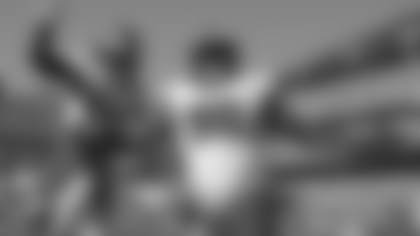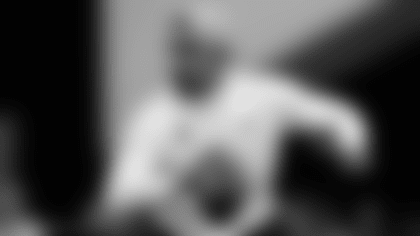Dr. J was my first sports hero. I loved him as a player, but also for the way he did things. This was true when I first started watching him as a kid and continued until he retired while I was in high school. One of my favorite Dr. J moments didn't involve a gravity-defying layup or soaring dunk.
Heck, it didn't even involve a basketball. It came in his retirement speech.
Doc thanked the fans and organization for all they did for him, but he mentioned that he wished something was different. He wished there was representation of more former players. He singled out a guy named Steve Mix, a solid forward from the 1970s and early 1980s. Mix played for the Sixers for nine years and was a part of some really good teams. He was a good starter and later on became a good role player. Doc knew the value that guys like that have to an organization. Teams should celebrate players like that as well as the big time stars.
The Eagles have had some elite stars over the years. Randall Cunningham, Donovan McNabb, Reggie White and Brian Westbrook were all special players, the type we tend to focus on when looking back at days gone by. I'd like to talk about some former Eagles that might fly a bit under the radar. Serious fans will likely know all these names. Casual fans may have forgotten the players or just not thought of them in a long time. Younger or newer fans may not know any of these guys.
C David Alexander
In the fifth round of the 1987 draft, the Eagles selected an offensive lineman named David Alexander from Tulsa. He was a star player in high school that dreamed of going to Oklahoma State. That fell apart in a recruiting trip when brash head coach Jimmy Johnson (yes, that guy) tried to force Alexander into committing on the spot. Alexander wanted to talk to his family before signing anything. Johnson pulled the scholarship offer (more reason to hate Helmet Hair) and Alexander ended up at Tulsa.
Alexander came from a different era of linemen. He was only 6-3 and 275 pounds. He might have gotten a bit heavier than that, but he was far from the 300-pound guys of today. He was a backup and special teams player as a rookie. In 1988, he saw most of his action at guard. He finally took over the starting center position in 1989. Alexander stayed there through the end of the 1994 season. In all, he started 108 straight games.
Alexander wasn't a player that was going to just simply overpower defenders. He was smart, technically sound and had some athletic ability. He was a stabilizing force for our offensive line. Some of you may not remember how crazy things were back then. In Alexander's six years as the starting center, he had quite a few starting guards play beside him. Mike Schad, Ron Solt, Dennis McKnight, Eric Floyd, Lester Holmes and Antone Davis were all full-time starters alongside Alexander. Offensive tackle was also a revolving door. Alexander was the one guy that the players and coaches could count on. Offensive line coach Bill Muir referred to him as "the glue that holds the line together."
Alexander never made the Pro Bowl. He wasn't a great player and he wasn't part of a great line. Those are the guys who generally get to the Pro Bowl. Alexander was a good player for us for several years. His reliability was a key factor for our line at a time when we won quite a few games. The worst record we had with him starting was 7-9 (1994).
DE William Fuller
One of my all-time favorite Eagles is William Fuller. He played left defensive end for us from 1994 through 1996. That was a special spot at the time. Reggie White had manned the left side from the mid-1980s through 1992. He then left for Green Bay. Owner Norman Braman acted like he wanted to keep White here, but that was all lip service. He was happy to see White move on. Braman knew he did have to sign someone with a big reputation to replace White. We added Tim Harris for the 1993 season. Harris was a talented pass rusher that had notched a lot of sacks for the Packers and Niners. He had a big name, but didn't seem like the right fit for us. Harris was a speed guy. We needed someone for the left side who could play the run and pressure the passer. The experiment didn't even get a chance to fail on its own. Harris only played in four games due to injury. He finished his Eagles career with the same amount of sacks as me - zero.
Heading into the 1994 season, the Eagles knew they needed to find a player for left end. The team once again went the free agent route. This time they landed William Fuller from the Oilers. He fit us like a glove. Fuller was 6-3 and 280 pounds. He was athletic enough to get to the quarterback, but also tough and physical. Fuller was a good run defender. He went up against his share of big right tackles and Fuller more than held his own.
I loved watching Fuller battle Erik Williams, the massive right tackle for the Cowboys. Fuller was several inches shorter and about 50 pounds lighter, but he made Williams work like a dog. Fuller wouldn't give ground. I think it frustrated Williams that he was unable to bully the smaller guy. After plays, Williams would take swipes at Fuller or get in a late shove. Fuller hit Williams right back. Fuller wasn't going to be intimidated.
 |
Fuller was more than an effort and toughness guy. He led the team in sacks in each of his three seasons. He posted 9.5 in 1994 and then 13 in each of the next two seasons. He also had 12 forced fumbles in his time in Philly. Fuller was quick off the edge. He played with good leverage. He also used his hands well. For those who didn't see him play, think of the left end version of Trent Cole. I was furious with Joe Banner for letting Fuller leave as a free agent following the 1996 season. I just couldn't understand that decision. Banner turned out to be right. Fuller was 35 years old heading into 1997 and had just six sacks in his two years out in San Diego. Sometimes age does catch up to our favorite players, even when we don't want to admit it.
FB Kevin Turner
Another free agent signing that turned out to be a great move was the 1995 addition of fullback Kevin Turner from New England. I remember seeing the transaction in the local newspaper, but didn't know enough about Turner to get real excited. My copy of *Eagles Digest *arrived sometime after that and told me all I needed to know. He caught 98 passes in three years for the Patriots. He also could run, block and play special teams. I was instantly excited to see this guy play. We had lacked a top fullback since Keith Byars left in free agency.
Turner got hurt after just a couple of games in 1995. He went to injured reserve and we signed James Saxon to replace him. Saxon was a veteran who did his best, but wasn't the kind of fullback you get excited about. All Eagles fans were happy to see Turner get healthy for 1996. He turned out to be a terrific player.
Turner was a good lead blocker. He weighed less than 240 pounds, but he would run through his targets. He lowered his shoulder and attacked. He was technically proficient. Turner chose the right guy to block and he positioned himself so that the tailback had a running lane. Ricky Watters was our primary back at the time. He set career highs with 1,411 yards and 13 touchdowns in 1996. Turner was a big part of that success.
What made Turner special was his ability as a runner and receiver. He had good hands. He was quick and elusive as a runner. He had pretty good speed. Most fullbacks are north-south runners with power. Turner was more like a running back. Jon Gruden actually ran screen passes to Turner on a regular basis. Turner was very effective on these plays. He was dangerous on the move. Gruden even used Turner on a wheel route sometimes. That is a downfield play where you want to isolate a back on a linebacker. It is rare that the fullback is involved. Turner finished his career with 236 catches and 10 touchdowns.
Sadly, Turner's prowess as a lead blocker caught up to him. He suffered a neck injury that prematurely ended his playing career halfway through the 1999 season. I would loved to have seen Turner play for a couple of years under Andy Reid. Turner was a lot of fun to watch. I'm sure Reid would have creatively worked him into the passing game.
RB Heath Sherman
Another former Eagle whose career was affected by injuries was running back Heath Sherman. He had a quiet rookie year, but then played very well in 1990. He ran for 685 yards and showed a lot of promise. You have to remember that back then we couldn't get a good running game going with any consistency. We lived and died with Randall Cunningham's magic. To see a young runner put up that total and average 4.2 yards per carry was surprising for us.
Expectations were high for 1991, but the offense that year was a disaster. Cunningham got hurt on the opening drive of the season. The line wasn't good. We had four different starting quarterbacks that year, never a good sign. The running game was awful. We had four different running backs average less than 3.5 yards per carry. Sherman ran for 279 yards, but only averaged 2.6 yards per carry.
No one knew what to expect in 1992. Herschel Walker was the big free agent addition and surely that would hurt Sherman's numbers. In the opener, Sherman ran for 50 yards and looked good. He then got hurt and basically disappeared until midseason. That's when Sherman began to play his best football. In the final eight games, Sherman ran for 497 yards and five touchdowns. He averaged 5.1 yards per carry. He also caught 17 passes. Sherman was even better in the playoff win at New Orleans. He ran 21 times for 105 yards and a score. He also caught three passes. Walker was the big-name running back, but during the winning streak at the end of the year and the playoff game it was Sherman who ran for more yards.
We would line up in the Ace formation (one back, two tight ends) and Sherman would pound on defenses. He wasn't huge, but he ran hard. Reid would classify Sherman as a downhill runner. He attacked the line of scrimmage. I think the linemen fed off the physical style of running and it helped the whole offense come alive. Sherman's last year in the league was 1993. Injuries ended his career and kept him from ever becoming as good a player as he could have been. Still, when he did stay healthy and got on a roll, the offense was a lot of fun to watch.
DE Brandon Whiting
The final player to talk about is Brandon Whiting. Like Fuller, he played left defensive end for us. Whiting was actually drafted in 1998 as a defensive tackle out of Cal. He was quick off the ball and disruptive. He didn't seem to have the strength/bulk to play inside in the NFL. Luckily someone decided to move him outside.
Whiting started at left end in 2000 and stayed there through the end of the 2003 season. He wasn't a gifted pass rusher. Whiting totaled six sacks in his first couple of seasons on the outside. He posted six in 2002. That got all of our attention. Maybe he was going to be the left end we needed. He was about 285 pounds and played the run pretty well. Whiting was very much an effort player. He hustled to get in on as many plays as possible.
Unfortunately, Whiting hurt his shoulder in 2003 and that really limited his performance. He only had a pair of sacks on the season. He was dealt in March of 2004. Whiting went to the Niners in the Terrell Owens trade. He played that year and then had to retire.
While Whiting was never a star, I think people forget the fact that he was a starting end for a winning team and a defense that had some really good years. In 2001, the defense never allowed more than 24 points in a game during the regular season. We finished second in the league in scoring defense. In 2002, we finished second in scoring defense again and fourth in yards allowed. It is too bad that we didn't get to see Whiting stay healthy. He might have developed into a good left end. His career was headed in the right direction. That shoulder injury affected his ability to play with power and Whiting just didn't have the athletic ability to overcome that.






















